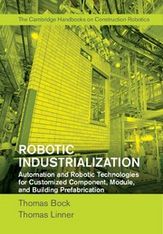Cambridge Handbooks on Construction Robotics Volume 2: Robotic Industrialization

In this volume, concepts, technologies and developments in the field of building-component manufacturing - based on concrete, brick, wood and steel as building materials and on large-scale prefabrication, delivering complex, customized components and products - are introduced and discussed. Robotic industrialization refers to the transformation of parts and low-level components into higher-level components, modules and finally building systems by highly mechanized, automated, or robot-supported industrial settings in structured off-site environments. Components and modules are open building systems (in modular building product structures) that are delivered by suppliers to original equipment manufacturers such as, for example, large-scale prefabrication companies or automated/robotic on-site factories. In particular, innovative large-scale prefabrication companies have altered the building structures, manufacturing processes, and organizational structures significantly to be able to assemble in their factories high-level components and modules from Tier-1 suppliers into customized buildings by heavily utilizing robotic technology in combination with automated logistics and production lines.
• A new interpretation of architecture and construction as a manufacturing industry that deals with product rather than with buildings: from building 'construction' to building 'production'
• Follows a cross-disciplinary approach that relates traditional architectural and construction knowledge with the latest knowledge from manufacturing, automation and robot technology
• Oriented towards technology application: shows by real world case studies application scenarios for each presented approach or technology and thus gives a good guide to real world implementation
Thomas Bock, Thomas Linner (Hg.)ISBN: 9781107076396